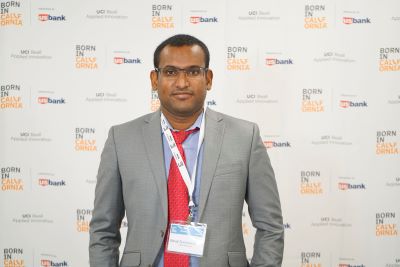Campus News
New program advises UCSC Ph.D. students on their path to entrepreneurship and venture capital
Many student-led innovations never make it out of the lab. A new program at UC Santa Cruz aims to change that by mentoring Ph.D. students in the life sciences on alternative career pathways outside academia: entrepreneurship and venture capital.


Many student-led innovations never make it out of the lab. A new program at UC Santa Cruz aims to change that by mentoring Ph.D. students in the life sciences on alternative career pathways outside academia: entrepreneurship and venture capital.
The Innovation & Business Engagement Hub, in collaboration with the California Institute for Quantitative Biosciences (QB3) at UCSC, launched a new fellowship program in 2022 organized through Nucleate, a free and collaborative student-run organization founded at Harvard University with a focus on identifying future “bioentrepreneurs.” Nucleate educates and empowers scientists and business students by building bridges within the biotech ecosystem and accelerating the formation of pioneering life sciences companies through its programs. It has a presence in 18 markets across the world, including a robust chapter in the Bay Area.
The UCSC Nucleate Innovation Fellowship includes a small cohort of graduate students who receive training and work on technology landscaping, due diligence and sourcing. The students have the opportunity to collaborate with a cohort of peers from other Bay Area universities and network with venture capitalists to brainstorm through challenges in translating cutting-edge science into new ventures. UCSC has had two sets of cohorts that have benefited from collaboration with previous fellows and engagement with the current Nucleate Venture Fellows from the Life Sciences and Entrepreneurship Center at UC Berkeley. The fellowship program lasts five months, and students receive a $4,000 stipend.
“I was excited to facilitate the new and growing collaboration with the Nucleate Bay Area Chapter to offer unique, innovation-focused experiential learning and leadership opportunities for our talented graduate students, as well as provide another pathway to catalyze the adoption and implementation of life science innovations being advanced by university-associated startups,” said Ryan Sharp, Assistant Vice Chancellor for Innovation & Business Engagement.
Fellowship recipients choose a target area for mentorship from academic and industry experts and interview companies founded at UCSC or other research universities. The fellows then compile the information into a written report and make a presentation that examines how the companies started, the core technologies involved, the industries they impacted, and the trends they found. After the technology landscape presentations, the fellows transition to technology sourcing, engaging with UCSC researchers, innovations, and entrepreneurs to help navigate the pathway of translating cutting-edge science into new ventures.
Megan Durham, a sixth-year P.h.D. student in Molecular, Cell and Developmental Biology who works in Biomolecular Engineering Associate Professor Angela Brooks’ lab and is one of two students in the current fellowship cohort, chose diagnostics as her area of focus.
“I am interested in the intersection of science and business, and Nucleate has been helpful to me in making connections,” Durham said. “I’ve met many scientific founders of UC startups and those in the investment field who are happy to talk with me about career prospects.”
Graduate students that have applied for the fellowship program also have the opportunity to engage in leadership roles within the Bay Area chapter. Two UCSC students are currently being integrated into the new regional leadership team.
Building on the fellowship collaboration, the Innovation & Business Engagement Hub recently launched a new partnership with the Nucleate Activator program. The Activator program pairs Ph.D. students with MBA students who are interested in launching a business venture. After teams are formed, the students participate together in workshops, are provided with networking and mentorship opportunities, and pitch their venture to a panel of judges.
Tobias Schmid, co-founder of the Nucleate Bay Area Chapter and an expert-in-residence at UC Berkeley, helped to launch UCSC’s program, which is now in its second year. Participating universities locally also include Berkeley, UC San Francisco, and Stanford.
“What makes us different is that we are student-run and have more than 550 active student volunteers worldwide,” said Schmid. “We’ve helped 250 teams (including 144 in the 2023 cohort) through the process of spinning out of the lab, and teams have raised $202 million so far. We also don’t take any equity or charge from these student-led ventures, so they remain in control.”
Balaji Sundararaman, a sixth-year P.h.D. student in Biomolecular Engineering who works in the Palegenomics Lab, participated in the inaugural UCSC fellowship cohort and is currently participating in the accelerator program to advance his business venture, DABOmics, which is focused on an affordable and less time-consuming way to sequence DNA mutations. BioGenesis Trials, the fourth-place team in the 2022 Santa Cruz Launchpad pitch competition, is also participating in the current accelerator cohort, and OrganOmics, the 2021 UCSC IDEA Hub pitch contest 3rd place team, was in the inaugural cohort.
“The human genome is like a 3,000-page cookbook, and we want to sequence and copy only the pages we need,” said Sundararaman, a past winner of Slug Tank 2019 and IDEA Hub 2021 with his previous company GenZ Diagnostics (later Genomics). “If there’s an error, it will mess up the recipe. It is expensive to look at all the pages to identify the error on a particular page. Our company aims to establish a time-efficient and cost-effective solution for targeted DNA sequencing.”
Learn more about the UCSC Nucleate Innovation Fellowship and Nucleate Activator program.